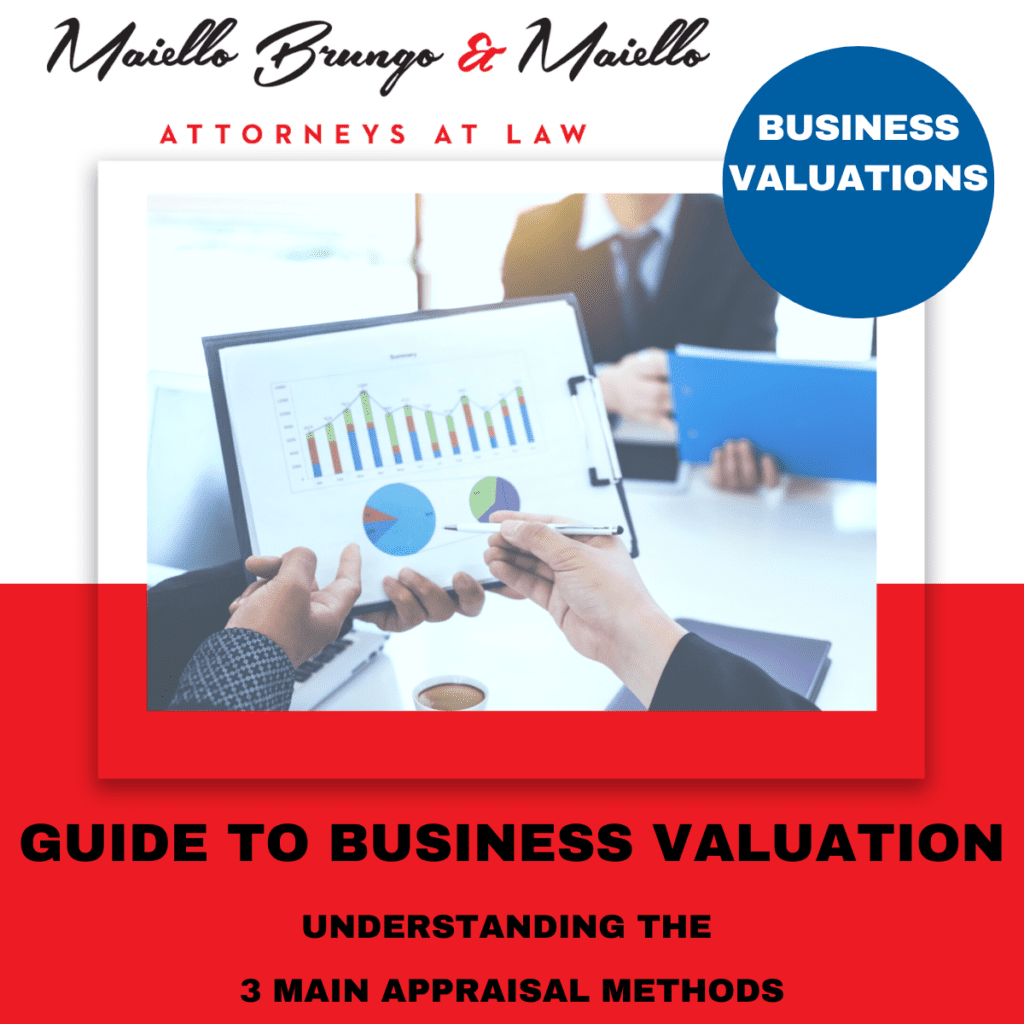Not all business appraisals are created equal.
An accurate business valuation is a critical element in making informed decisions, whether it be for a merger, an acquisition, litigation, or other financial transactions involving your business. There are several different valuation methods, and knowing which one to choose can maximize your profits. The three best valuation methods are the income approach, the market approach, and the asset (cost) approach.
Get Legal Assistance for Your Business
Income Approach to Business Valuation
The income approach, also known as the discounted cash flow (DCF) method, is based on the principle that a business’s value is determined by the present value of its future cash flows. Under this approach, the expected future cash flows generated by the business are estimated and then discounted back to their present value. This method is particularly useful for businesses with established revenue streams and predictable cash flows. The primary steps involved in the DCF approach include:
- Projections: Estimate future cash flows, which may involve revenue forecasts, expense projections, and growth assumptions.
- Discount Rate: Determine the appropriate discount rate, often based on the business’s risk profile, incorporating the cost of capital.
- Terminal Value: Calculate the terminal value, representing the perpetual cash flows beyond the projection period.
- Discounting: Discount future cash flows and terminal value to their present value.
- Business Value: Sum the present values to arrive at the business’s overall value.
Market Approach to Business Valuation
The market approach relies on the principle that a business’ value can be determined by comparing it to similar businesses that have been recently sold or traded on the market. This business valuation method depends on the availability of a sufficient number of comparable transactions to draw meaningful conclusions. The primary methods within the market approach include:
- Comparable Sales Method: This approach assesses the value of the subject business by comparing it to other similar businesses that have recently been sold, using metrics such as revenue multiples or EBITDA (earnings before interest, taxes, depreciation, and amortization) multiples.
- Guideline Public Company Method: This method relies on the valuation of publicly traded companies in the same industry, applying similar financial metrics.
- Guideline Merged and Acquired Company Method: This approach compares the subject business to companies that have undergone merger or acquisition transactions, using the transaction price as a benchmark.
Asset (Cost) Approach to Business Valuation
The asset or cost approach evaluates the business’ value by determining the cost to recreate or replace its assets. This method is particularly relevant for businesses with significant tangible assets, such as real estate or manufacturing equipment. The key steps in the asset approach involve:
- Identifying Tangible and Intangible Assets: Catalog all tangible assets and identify any intangible assets, such as patents, trademarks, or other intellectual property.
- Estimating Fair Market Value: Determine the fair market value of each asset.
- Subtracting Liabilities: Deduct the business’s liabilities from the total asset value to arrive at the net asset value.
- Adjusting for Obsolescence: Adjustments for asset obsolescence, depreciation, or appreciation.
- Business Value: The net asset value, after adjustments, represents the business’s value.
Which Valuation Method is Right for Your Business?
It’s important to note that each approach has its merits and limitations, and the choice of method should be tailored to the specific circumstances of the business being valued. It is not a question of which is the better method, but which is the best valuation method for your business. Ask yourself the following questions:
- Why is this being valued?
- When do I need it valued?
- What exactly is being valued (the whole or parts)?
- What type of valuation do I need?
The answers will help guide the approach. The best way to get the fairest evaluation is to hire an experienced business valuator to advise you and provide you with a solid understanding of the economic value of your company.
Get Help Determining the Value of Your Business
Confidently navigate mergers, acquisitions, litigation, and more with an accurate understanding of your business’s value. For proven help determining the value of your business, contact the experienced business lawyers at Maiello, Brungo & Maiello, LLP.


